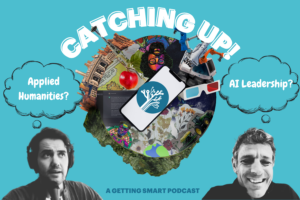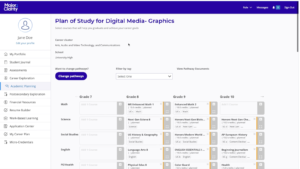Next-Gen Advisory: 10 Keys to College & Career Readiness

College and career readiness means a lot more than passing a community college entrance exam (although that is the minimum bar for all kids). It requires a set of deeper learning experiences that result in the knowledge, skills and dispositions young people will need to succeed (for more see David Conley’s new book, Getting Ready for College, Careers, and the Common Core: What Every Educator Needs to Know ).
In many high schools, the shuffle of a discipline-based, big-catalog master schedule can lead to a lack of sustained relationships and opportunities for students to fall through the cracks. Important outcomes get little attention with the lack of a an advisory spine.
All of the great high schools that I visit have a strong distributed counseling system and advisory structure–a souped up homeroom that promotes a sustained relationship with an advisor, academic monitoring and management, and links to services.
Ted Sizer and the Coalition of Essential Schools spread the advisory gospel in the 80s and 90s. Because it was largely a manual labor of love, advisories varied in structures, function, and effectiveness.
The toolset for college awareness, preparation, application and aid is slowly getting better. Get Schooled released a useful review of tools and resources last week that identified market gaps for younger and low income students.
Next-generation advisory will combine daily (or at least three times per week) meetings with desktop apps that surface data from a variety of sources to provide real time guidance. Next-gen advisory will fulfill or coordinate 10 functions:
1. Academic monitoring. Next gen platforms (e.g., EAA Buzz and Summit Activate) surface daily progress reports facilitating timely conversations between advisors and students.
2. Homework help. The advisory period can be a place to connect with a little extra help, including online support (e.g., Tutor.com, OpenStudy).
3. Developing self direction. Author James Davison Hunter said character is 1) the self restraint to say no, 2) making affirmations of ideas bigger than self, and 3) making a choice. Character development and habits of self management can be discussed in advisory and reinforced with curriculum (e.g. Navigation 101) and productivity apps (e.g., Remember The Milk).
4. Academic mindset and culture. Launch Expeditionary Learning Charter School starts the day with Crew, a 30 minute advisory period where they practice and talk about the shared Habits of Heart and Mind central to the Launch culture: accountability, craftsmanship, wonder, mindfulness, and compassion.
5. Social & emotional learning. Summit Public Schools encourage habits of success based on the CASEL framework.
6. College awareness & application. Good schools build college talk into their culture and arrange lots of college visits–at IDEA Public Schools students visit 15-20 colleges. Upper division advisories coordinate the college application process using resources including College Board Big Future, Naviance, Zinch. Groups like Strive for College use mentors and data to help students make the best possible post secondary choice.
7. Transcript management and course selection. With the growth of online course choice (see feature on Louisiana) helping students build a thoughtful pathway and transcript is of growing importance.
8. Career awareness. New tools are helping to boost awareness of career options (e.g., Mytonomy, Mapping Your Future). Networks like Cristo Rey use an advisory period to prepare students for work study.
9. Counseling. In a distributed counseling model, advisors are often the first to spot potential problems, provide first line support, and refer students to a school counselor.
10. Connection to youth and family services. When advisors identify student or families needs, they can make referrals to a web of community support groups through a partner like Communities in Schools.
These 10 functions make up the spine of a next-gen secondary school. There is some overlap on this list so the agreed upon functions at your school may only be a half a dozen functions. These functions are important enough to warrant time every day, staff development, strong coordination, an adopted curriculum and personalizing tools.
OpenStudy is a portfolio company of Learn Capital. Tom is a director at Strive for College.








0 Comments
Leave a Comment
Your email address will not be published. All fields are required.